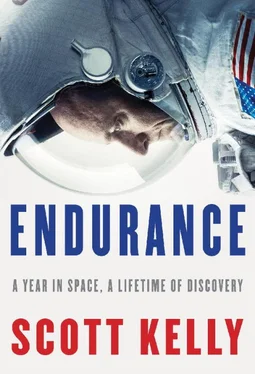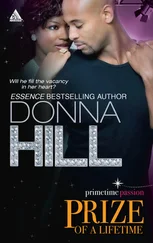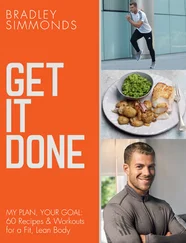Results and scientific papers will continue to emerge over years and decades based on the four hundred experiments we conducted over the year. Misha and I were a sample size of only two—we need to see many more astronauts stay in space for longer periods of time before we can draw conclusions about what we experienced. I do feel as though I’ve made discoveries—it’s just that those discoveries can’t entirely be separated from what I’ve learned from my other missions in space, other periods of my life, other challenges, other lessons.
As much as I worked on scientific experiments, I think I learned at least as much about practical issues of how to conduct a long-range exploration mission. This is what crew members on ISS are always doing—we are not just solving problems and trying to make things better for our own spaceflights, but also studying how to make things better for the future. So even the smallest decisions I made or negotiations I undertook with the ground were directed toward larger questions of resource management. And the larger struggles of my mission—most notably, CO 2management and upkeep of the Seedra—will have a larger impact on future missions on the space station and future space vehicles. NASA has agreed to manage CO 2at a much lower target level, and better versions of carbon dioxide scrubbers are being developed that will one day replace the Seedra and make life better for future space travelers, and I’m thankful for that.
Personally, I’ve learned that nothing feels as amazing as water. The night my plane landed in Houston and I finally got to go home, I did exactly what I’d been saying all along I would do: I walked in the front door, walked out the back door, and jumped into my swimming pool, still in my flight suit. The sensation of being immersed in water for the first time in a year is impossible to describe. I’ll never take water for granted again. Misha says he feels the same way.
I’ve been assigned to a spaceflight or in training for one practically nonstop since 1999. It will be an adjustment to no longer be planning my life this way. I have a chance to reflect on what I’ve learned.
I’ve learned that I can be really calm in bad situations. I’ve known this about myself since I was a kid, but it has definitely been reinforced.
I’ve learned to better compartmentalize, which doesn’t mean forgetting about feelings but instead means focusing on the things I can control and ignoring what I can’t.
I’ve learned from watching my mother train to become a police officer that small steps add up to giant leaps.
I’ve learned how important it is to sit and eat with other people. While I was in space, I saw on TV one day a scene of people sitting down to eat a meal together. The sight moved me with an unexpected yearning. I suddenly longed to sit at a table with my family, just like the people on the screen, gravity holding a freshly cooked meal on the table’s surface so we could enjoy it, gravity holding us in our seats so we could rest. I had asked Amiko to buy a dining room table; she did, and sent me a picture of it. Two days after landing, I was sitting at the head of the new table, a beautiful meal my friend Tilman had sent over spread out on it, my family gathered around me. Amiko, Samantha, Charlotte, Mark, Gabby, Corbin, my father. I could see them all without moving my head. It was just how I’d pictured it. At one point in the after-dinner conversation, Gabby pointed urgently at Mark, then me, back and forth, back and forth. She was pointing out that Mark and I were both making exactly the same gesture, our hands folded on top of our heads. I’ve learned what it means to be together with family again.
I’ve learned that most problems aren’t rocket science, but when they are rocket science, you should ask a rocket scientist. In other words, I don’t know everything, so I’ve learned to seek advice and counsel and to listen to experts. I’ve learned that an achievement that seems to have been accomplished by one person probably has hundreds, maybe even thousands, of people’s minds and work behind it, and I’ve learned that it’s a privilege to be the embodiment of that work.
I’ve learned that Russian has a more complex vocabulary for cursing than English does, and also a more complex vocabulary for friendship.
I’ve learned that a year in space contains a lot of contradictions. A year away from someone you love both strains the relationship and strengthens it in new ways. I’ve learned that climbing into a rocket that may kill me is both a confrontation of mortality and an adventure that makes me feel more alive than anything else I’ve ever experienced. I’ve learned that this moment in American spaceflight is a crossroads where we can either renew our commitment to push farther out, to build on our successes, to keep doing harder and harder things—or else lower our sights and compromise our goals.
I’ve learned that grass smells great and wind feels amazing and rain is a miracle. I will try to remember how magical these things are for the rest of my life.
I’ve learned that my daughters are remarkable and incredibly resilient people, and that I have missed a piece of each of their lives that I can never get back.
I’ve learned that following the news from space can make Earth seem like a swirl of chaos and conflict, and that seeing the environmental degradation caused by humans is heartbreaking. I’ve also learned that our planet is the most beautiful thing I’ve ever seen and that we’re lucky to have it.
I’ve learned that voluntary spinal taps are not much fun.
I’ve learned a new empathy for other people, including people I don’t know and people I disagree with. I’ve started letting people know I appreciate them, which can sometimes freak them out at first. It’s a bit out of character. But it’s something I’m glad to have gained and hope to keep.
—
I TOLD my flight surgeon Steve I felt well enough to get right to work immediately upon returning from space, and I did, but within a few days I felt much worse. This is what it means to have allowed my body to be used for science. I will continue to be a test subject for the rest of my life.
A few months later, I felt distinctly better. I will continue to participate in the Twins Study as Mark and I age. Science is a slow-moving process, and it may be years before any great understanding or breakthrough is reached from the data. Sometimes the questions science asks are answered by other questions. This doesn’t particularly bother me—I will leave the science up to the scientists. For me, it’s worth it to have contributed to advancing human knowledge, even if it’s only a step on a much longer journey.
I’ve been traveling the country and the world talking about my experiences in space. It’s gratifying to see how curious people are about my mission, how much children instinctively feel the excitement and wonder of spaceflight, and how many people think, as I do, that Mars is the next step.
In the summer, my father was diagnosed with throat cancer and began receiving radiation therapy. In October, he became much more ill. One evening, Amiko got a phone call from him, which wasn’t unusual. He had depended on her support a great deal while I was in space, and they had continued to talk often. But that day, he didn’t want anything in particular.
“I just wanted to let you know how much I love you, sweetheart,” he told her. “I’m just so glad you and Scott have each other. You’ve accomplished so much together, and all the stuff you’ve been through—it was all worth it.” Amiko thought this was out of character for him, but she said he sounded much better than he had in a while. A few days later, he took a turn for the worse, and while Mark, Amiko, and I were all out of the country, he died in the intensive care unit with my daughter Samantha by his side, four and a half years after my mother. I was grateful Samantha could be there with him.
Читать дальше












